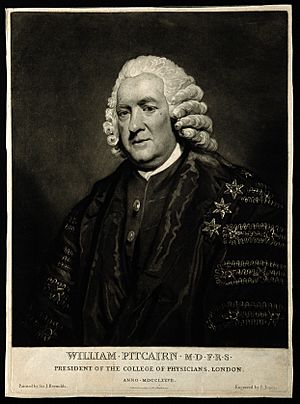William Pitcairn facts for kids
William Pitcairn (born May 9, 1712 – died November 25, 1791) was a smart Scottish doctor and a plant expert. He was known for his work in medicine and for his love of botany, which is the study of plants.
William Pitcairn helped many people as a physician. He also made important contributions to the world of plants. He was a respected figure in the scientific community of his time.
Contents
Early Life and Family Connections
William Pitcairn was born in a town called Dysart in Scotland. He was the second son in his family. His father was a reverend, which is a type of religious leader.
William had a younger brother named John Pitcairn. John became an officer in the British Marines. Sadly, John was killed during a famous battle called the Battle of Bunker Hill.
William's nephew, Robert Pitcairn, was also important. Robert was a midshipman in the Royal Navy. A famous island in the Pacific Ocean, Pitcairn Island, is named after him.
William Pitcairn's Education
William Pitcairn was a very dedicated student. He studied medicine at several famous universities. His learning journey took him to different countries.
He first attended the University of Leiden in the Netherlands. After that, he went to the University of Rheims in France. There, he earned his first medical degree, known as an MD.
Later, William traveled to England. He continued his medical studies at the famous Oxford University. In 1749, he received a second degree in medicine from Oxford.
Career as a Physician and Leader
After finishing his studies, William Pitcairn moved to London. He became a doctor at St Bartholomew's Hospital, a very old and respected hospital. He helped many patients there.
William also became a Fellow of the Royal College of Physicians. This is a group of highly skilled doctors. He gave special lectures there in 1752. These lectures were called the Goulstonian lectures.
He was so respected that he became the President of the Royal College of Physicians. He held this important leadership role from 1775 to 1784.
Contributions to Botany
William Pitcairn was not only a great doctor but also a passionate botanist. He loved studying plants and growing rare ones. His interest in plants was well-known.
In 1770, he was chosen to be a Fellow of the Royal Society. This is a very prestigious group of scientists. He was recognized for his "application to Botany and success in rearing scarce and foreign plants." This means he was good at growing unusual plants from other countries.
A special type of plant, a bromeliad, was named after him. This plant genus is called Pitcairnia. This shows how important his work in botany was.
Later Life and Legacy
William Pitcairn passed away in Islington, London, on November 25, 1791. He was 79 years old. He was buried in a vault inside the church of St Bartholomew the Less. This church is located within the hospital where he worked.
William Pitcairn is remembered as a brilliant physician and a dedicated botanist. His contributions to medicine and plant science left a lasting impact.
 | May Edward Chinn |
 | Rebecca Cole |
 | Alexa Canady |
 | Dorothy Lavinia Brown |


